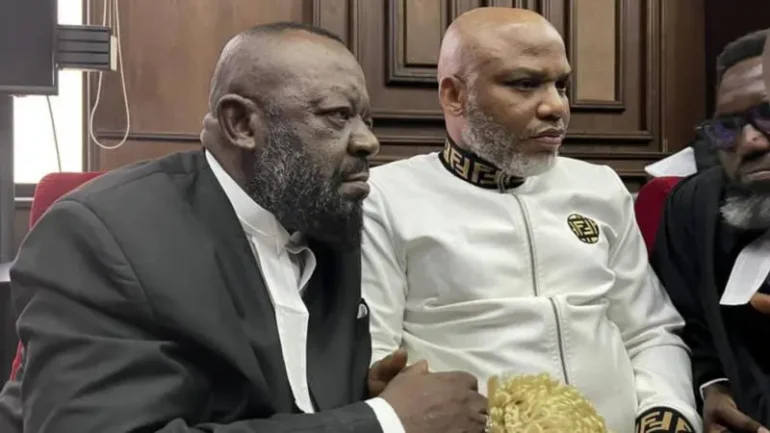Counsel to Nnamdi Kanu, Aloy Ejimakor, has vowed to appeal the life sentence handed down to the detained leader of the Indigenous People of Biafra (IPOB) by the Federal High Court in Abuja on Thursday.
Justice James Omotosho had earlier convicted Kanu on multiple counts of terrorism and sentenced him to life imprisonment on counts one, four, five, and six. He also imposed 20 years on Count Three and five years on Count Seven, each without an option of fine. All sentences are to run concurrently.
Speaking to journalists after the verdict, Ejimakor said the legal team would immediately head to the Court of Appeal.
“We are heading to the Court of Appeal. The Court of Appeal is the only court in this country that sits as a jury. We will ask the justices to check what happened today,” he said.
He described the ruling as “a symbol of the travesty of justice that everybody has suspected,” insisting that the conviction lacked a legal foundation.
“If the Court of Appeal disagrees with us, we head to the Supreme Court. By God Almighty, Nnamdi Kanu will not stand convicted. Today is the only day I have seen a man convicted for what he said, not what he did,” he added.
Ejimakor argued that the sentence was excessive and unjust.
“The sentence is overboard, cruel, and unusual. How can you convict a man for making a broadcast from an unnamed location? He never tied that broadcast to any violence—not even someone slapping someone,” he said.
He maintained that Kanu’s broadcasts could not reasonably be interpreted as terrorism.
“Nnamdi Kanu is not a terrorist. Seeking a separate nation is not a crime. In Nigeria today, if someone says ‘don’t be silly,’ you get convicted. Mazi Nnamdi Kanu made a broadcast—so what? You convict him for terrorism over words? What precedent is this?” Ejimakor said.
In his judgment, Justice Omotosho held that the prosecution proved its case beyond reasonable doubt, ruling that Kanu used threats, incitement and directives to instigate violent acts across the South-East.
The court also held that Kanu’s refusal to present a defence and his alleged disruptive conduct during proceedings weighed against him. The prosecution had asked the court to impose the maximum penalty under the Terrorism Prevention Act.
Kanu’s legal battle, which began in 2015 with charges of treasonable felony and terrorism, has become one of Nigeria’s most controversial and protracted cases. He fled the country in 2017 after an army raid on his home during “Operation Python Dance,” and was later re-arrested in Kenya in 2021 under disputed circumstances—an episode his legal team calls an “extraordinary rendition.”
Over the years, prosecutors expanded the charges to 15 counts, while Kanu’s lawyers have repeatedly questioned the legality of the proceedings, arguing that unresolved issues around jurisdiction and extradition undermine the validity of the trial.


